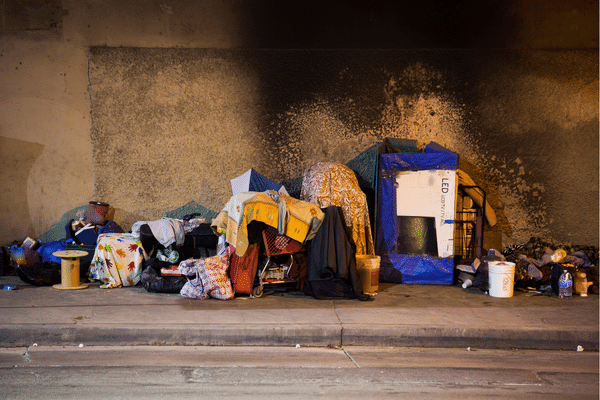
How to Prepare for a Successful Move to Denver: a Step-by-Step Guide
Moving to a new city can be both exciting and overwhelming. Denver, known for its vibrant culture, stunning natural beauty, and thriving job market, is
You can sell your house with squatters in it. But the honest truth is the number of people that will buy your house if squatters are living in there are slim.
We Buy Houses In Denver is a professional cash buyer and we’ll buy it. We buy the squatter house no matter how trashed it is. We will deal with the squatters. You can simply walk away with your cash.
If you are interested in selling fast, selling as-is, and selling for cash you can fill out our online from.
Click this link to get a free, no obligation cash offer to sell your home – anywhere in Colorado!
If you want to learn more about squatters rights in Colorado – keep reading. We have put together a comprehensive guide for you.

Everything you need to know about SQUATTERS RIGHTS COLORADO: Imagine visiting your empty rental in Denver to find someone has taken up residence without your knowledge. Or even worse, buying a new house and finding someone squatting for months, leaving a mess in their wake. This can be a real problem because, in some circumstances, US law recognizes squatters as the legal owners of a property.
So what can you do if you have a squatter in your house in Colorado?

Squatter Rights Colorado: Real Estate Attorney confronts squatter in a Denver rental unit.
You must understand Colorado squatter’s rights to protect your property if you own a house, rental or any real estate in Colorado. When squatters take up residence in your house, removing them can be more challenging than you might think, and the law can work in their favor.
In this article, you will receive expert advice, including:
Spoiler alert, prevention is always better (and cheap) than a cure – especially when addressing squatters’ rights legally. Follow this link to learn 10 ways to prevent squatters from ever residing in your home.

In Colorado, the definition of a squatter is anyone who resides in an unoccupied property without the owner’s consent. In most cases, these properties are unoccupied, abandoned, or foreclosed. While it’s rare for a squatter to acquire a commercial building, it still occurs in certain situations.
Landlords Beware:
There are many nonprofit agencies across the state that are notorious for advising people on how to make adverse possession laws work in their favor.

A squatter will make claims that they are allowed to be on the property. A squatter will:
Trespassers are short-term intruders. They do not make claims to ownership or legal occupancy.
You can sell your house with squatters. The trick is to find a buyer willing to buy it because most buyers aren’t buying a home with settlers in there.
Most likely, the buyer will be a real estate investor. They may be an i-buyer, cash buyer, or national or local company.
These buyers will buy your house as-is. This means you can sell your home to them if someone lives there. An added benefit of selling as-is is that you to fix or repair any damage the squatter may have caused.
We Buy Houses In Denver is a Colorado home buyer that can buy your house in any situation. To talk about your options to sell your Colorado property follow this link to be connected with one of our friendly specialists.
Colorado Squatters Rights and Adverse Possession Claims: Understanding the Impact on Property Owners
Introduction: Squatters’ rights and adverse possession claims can pose significant challenges for property owners in Colorado. Adverse possession is a legal concept that allows a person to claim legal ownership of someone else’s property under certain circumstances. In this article, we will delve into the intricacies of adverse possession claims in Colorado, their impact on property owners, and relevant terms such as legal ownership, color of title, legal consent, acquire legal ownership rights, claim legal ownership, and criminal trespass.
Adverse Possession Claim Explained: An adverse possession claim refers to a legal process by which someone can acquire legal ownership rights over a property without the owner’s consent. Several elements must be met to succeed in an adverse possession claim, including open and notorious possession, exclusive possession, continuous possession for a specific period, and hostile possession.
Colorado’s Adverse Possession Laws: In Colorado, adverse possession claims are governed by specific statutes and common law principles. To claim adverse possession, the occupant must demonstrate actual, continuous, and exclusive possession of the property for at least 18 years. The possession must be hostile, without the owner’s permission, and open and notorious, meaning visible to the public or the owner.
Impact on Property Owners: Property owners may face severe consequences when squatters successfully claim adverse possession. They may lose legal ownership rights to their property, and the settlers become the new legal owners. This can devastate property owners who have invested time, money, and effort into maintaining and improving their properties.
The Importance of Color of Title: The concept of “color of title” often plays a significant role in adverse possession claims. Color of the title refers to a claim of legal ownership based on a defective or incomplete title document. If a settler possesses a property under the color of title, the possession period required for an adverse possession claim may be reduced to seven years in Colorado.
Legal Consent and Adverse Possession: One critical aspect of adverse possession claims is that they occur without the property owner’s legal consent. The property owner may not be aware of the settler’s presence or may have initially allowed temporary use of the property without granting permission for long-term occupation. Adverse possession claims can undermine the principle of consent in property rights.
Protecting Against Adverse Possession Claims: Property owners in Colorado should take proactive steps to protect themselves against adverse possession claims. Regular property inspections, promptly addressing trespassers, posting “No Trespassing” signs, and asserting their rights can help prevent adverse possession claims.
Criminal Trespass and Adverse Possession: It’s important to note that criminal trespass is distinct from adverse possession. Criminal trespass occurs when someone unlawfully enters or remains on another person’s property without permission. Property owners should promptly report any criminal trespass to law enforcement authorities.
Conclusion: Understanding adverse possession claims and their implications for property owners in Colorado is crucial. By familiarizing themselves with the legal concepts surrounding adverse possession, such as legal ownership, the color of title, legal consent, acquiring legal ownership rights, claiming legal ownership, and criminal trespass, property owners can better protect their rights and prevent adverse possession claims from arising or succeeding. Proactively safeguarding one’s property rights is essential in maintaining legal ownership and avoiding the potential consequences of adverse possession.

Quite simply a squatter has very similar rights as a tenant.
An “unauthorized tenant” – or squatter – resides in a home where they do not have legal permission to stay. As stated, squatters in Colorado have rights akin to that of a tenant. Therefore to remove them they must be formally evicted.
Squatting is usually a civil case compared to trespassing which is a criminal offense. Although the individual enters into a residence without legal permission, they carry the intention to claim ownership eventually.
The Adverse Possession Law allows a squatter to become the legal owner of that property if they meet specific criteria. In Colorado, these terms include constant possession of the property for a minimum of 18 years or possession for seven years with the color of title.
If you are a property owner, you must have the legal documentation to prove you own the house. Because once a squatter enters a property, they have the right to make use of it – and – after enough time has passed, they can apply to become the legal owners of that property.

The 1862 Homestead Act allows individuals to gain possession of a property after spending a suitable amount of time in residence. These laws allow individuals to gain possession if they have made repairs and improvements to the house and have paid either taxes or rent on the property.
These measures are designed to prevent the state from being flooded by an array of rundown houses. And the specified criteria make squatters more likely to take care of and maintain the property they wish to acquire.
If a property is left in a state of disrepair for numerous years, the courts are more likely to vote in favor of a squatter who can improve that property and keep the area looking nice.

If you want to remove squatters from your Colorado home, you must follow the correct legal procedure.
If the squatter claims to be a tenant, you may need to remove them by following the lawful eviction process of Colorado. It’s worth noting that “self-evictions” are illegal in Colorado, so avoid threatening, terminating essential services, or forcibly removing any person who claims to be a tenant.
More recently, a bill was passed by the Colorado Senate to make it much easier to remove squatters.

Thanks to the passing of the 2018 Bill SB 18-015, removing a squatter in Colorado is easier and faster.
The new bill streamlines the process of removing squatters. Now you can have a ruling from the court within 48 hours. This ruling would include permission for the sheriff to remove the squatter legally.
Because it is faster, the new law saves homeowners from:

The law called the “Protecting Homeowners and Deployed Military Personnel Act” allows a homeowner to file a complaint. When filed correctly, the complaint can be heard, and a ruling given within 48 hours.
The ruling, if in the favor of the owner, can include the immediate and lawful removal of the squatter. The removal would be performed by the local sheriff.
To evict a squatter in Colorado you must follow the same process as if you were evicting a legal tenant. Personally, as a landlord myself, this seems unfair, however, they are the rules and therefore you have to follow them.
Thankfully for Landlords and property owners in Colorado, the eviction process is well defined and simple to follow.

Can you turn off the utilities on a squatter?
Unfortunately, you can’t turn off the utilities on a squatter. Once a person has squatter rights, the landlord cannot turn off the utilities. However, there are certain things you can do as a property owner.
USEFUL RESOURCE: Can I turn off utilities on a squatter?
Before you take any steps, you might want to consult with a real estate attorney.
Evicting a squatter or tenant can be relatively quick in Colorado. We will use the example that your squatter has failed to pay rent. The process eviction process might look like this:
The process to evict a squatter could take anywhere from 11 days to over 100, depending on how vigilant the owner is in filling out the necessary docs and the timing of court availability.

USEFUL RESOURCE: You can read about a true story about a Colorado squatter situation right here.
“I want to sell my house fast for cash, but there are squatters on my property!”
You can sell your house to us in any situation. If squatters are living there, we will buy it. Get a cash offer today.
“I needed to sell my house in a hurry because squatters were trashing it. WeBuyHousesInDenver.org took care of everything!”

After 18 years of residence in a property that a squatter has made their home, they will be able to apply for possession by filing an adverse possession claim with the courts.
The way to stop a squatter in Colorado from taking legal possession is to not leave your property unattended for 18 years. Sounds easy enough, right?
The courts are likely to favor a settler who has attempted to improve the state of a property compared to an owner who has left it derelict for 18 years. The best way to prevent a squatter from taking possession of your building is to conduct regular maintenance and inspections on the property yourself.
If you think of selling a vacant house and want to avoid spending money, then prevention is always cheaper than a cure.
A squatter can apply for adverse possession after 18 years of continuous residence in a property.
This time is reduced to seven years if the squatter has a color of title and has paid property taxes or rent bills.

The rules of Adverse Possession allow the non-legal owner of a building to acquire possession if they meet a specific set of criteria. These criteria include the following:
The possession must be “actual,” meaning that the squatter must treat the home as their own. They must remain physically present over some time and complete regular maintenance work as the building owner would.
The possession must be “open and notorious,” meaning that anyone should be able to recognize that the squatter is permanently residing on the property – this includes the building’s legal owner.
The possession must be “exclusive,” meaning that the squatter must be seeking to claim ownership themselves and not as part of a group of other squatters.
The possession must be “continuous,” meaning the squatter must reside on the property for an unbroken period. In Colorado, the length of this period is at least 18 years. If the squatter leaves the property for any significant period, they have “abandoned” it, and the entire process begins again from scratch.
The Possession must be “hostile,” meaning the squatter defines their residence as “simple occupation,” “awareness of trespassing,” or “good faith mistake.”
Simple occupation is a hostile claim that goes against the owner’s interest, where the squatter may or may not know the legal owner of the home.
Awareness of trespassing means that the squatter is aware their actions could be deemed trespassing and understand that they have no right to live on the property.
A good-faith mistake means that the trespassing is an innocent error on the part of the squatter. This includes relying on a document that they thought was valid but, in reality, is not.
Color of Title
When researching squatter’s rights in Colorado, you will inevitably meet the term “color of title.” In simple terms, a person has “color of title” to a property at any time when the document referencing ownership is invalid.
If a squatter is residing in a property that has color of title, they will only need to reside in the property for seven continuous years before making an adverse possession claim.

Squatters Rights Colorado: The simple fact is the squatters have rights in Colorado. Squatters can be more challenging to get rid of than you think. The best way to prevent a squatter from claiming legal rights to your property is to prevent them from entering in the first place.
Putting these measures in place protects yourself and your investment; you can take quick action if you spot a squatter. As Colorado law requires 18 years of residence, you should be able to prevent a person from claiming legal ownership as long as you check in to your property regularly.
WeBuyHousesInDenver.org is the best Home buyer in Denver with no closing costs. In case, you find yourself facing a squatter, you must know your options. You should also know how long it will take to evict a squatter once they have gained legal rights to your property through a court order, so you can plan accordingly.
Squatters have rights in Colorado. If a person in your house is awarded squatters rights, you must treat them like they are tenants with a lease.
The law that gives a trespasser squatters rights in Colorado is called adverse possession.
Once the adverse possession law is in place, the squatter can legally stay in the house. It is at this point they must be treated just like a tenant.
EXPERT ADVICE: If you have a tresspaser or someone staying in your property without permission, you must immediately do this! Call the police.
When you call the police, tell them someone has broken into your house. Ask them to remove the intruder. If the police remove the intruder, you don’t have a squatter or squatter problem to deal with.
If the police call you back and tell you that you have a squatter in your house, then I highly recommend you contact a real estate attorney.
As a professional real estate investor, I encounter many situations, including squatters. Because of this, I am regularly asked:
“Can I turn off utilities on a squatter?”
Here is the answer:
You cannot turn off utilities on a squatter because squatters have rights in all 50 states.
USEFUL RESOURCE: Can I turn off utilities on a squatter?
You can do some simple and cheap things to prevent squatters from entering your house or rental property. Some preventative measures you can take to stop squatters include:
Check out this complete guide on how to prevent squatters for more great ways to stop squatters from choosing to live in your house.
Absolutely! You can evict a squatter in Colorado. In-fact, if you have a squatter in Colorado, that is the only legal way to get them out of your house.
It probably seems unfair that someone can break into your house as a trespasser or criminal and then live there for free. But that is the law.
Therefore, to have a squatter removed, you need to follow the Colorado tenant eviction process.
However, before evicting them, YOU SHOULD CONTACT LAW ENFORCEMENT. Let them know there is a trespasser in your property. The police may go to your rental property and simply remove the person. If this happens then you don’t have to evict them.

WeBuyHousesinDenver.org is a reputable company that pays cash for homes, and WE BUY HOUSES FOR CASH is a cash home buyer in Denver and all across the front range you can sell your house to us fast, starting with a free cash offer by filling out our form.
We are the authorities when it comes to buying houses in Denver and all of Colorado for cash. We can buy any Denver property in any situation like a squatter is in the homes.
Our mission is to give the people of the Mile High city the best solution to sell any house. When you sell your house to us:
This is how selling a house in Denver should be!
Fill out the form to get your no-obligation cash offer today.
WeBuyHousesInDenver.org is your solution to selling your house because as Denver’s number 1 cash buyer of all types of properties we will buy any house in any condition so if you want a cash offer on your property simply give us a call or fill out an online form and our team of experts will get to work, quick smart, to help you get your house SOLD!
Other benefits when you sell your house to us. .
BENEFITS FOR YOU WITH OUR PROVEN PROCESS:
When you sell your house to us, there are:
![]() NO Fees, and we cover all the typical closing costs.
NO Fees, and we cover all the typical closing costs.
![]() NO Stress because you know what is happening at all times – you are in control!
NO Stress because you know what is happening at all times – you are in control!
![]() Sell your house fast and for easy cash.
Sell your house fast and for easy cash.
![]() Sell your home as-is (no repairs)
Sell your home as-is (no repairs)
![]() Pay nothing out of pocket
Pay nothing out of pocket
![]() Sell fast – you pick the closing date
Sell fast – you pick the closing date
![]() Sell for cash – no bank fees or financing delays
Sell for cash – no bank fees or financing delays
![]() 100% Free – no cost and NO STRESS!
100% Free – no cost and NO STRESS!
This is how selling a house in Denver should be!
Fill out the form to get your no-obligation cash offer today from Denver’s best cash home buyer.

Moving to a new city can be both exciting and overwhelming. Denver, known for its vibrant culture, stunning natural beauty, and thriving job market, is
Value add in real estate means finding ways to make a property more valuable. This can include things like renovating, improving operations, or changing how
Colorado Springs is a great location for rental property owners, but even in high-demand rental markets, selling your rental property sometimes makes financial sense. The
We’re a service-focused, home buyer that specializes in helping homeowners get rid of burdensome houses quickly. We are Colorado cash buyers who can buy your house fast with a fair all-cash offer. Imagine an instant online quote to sell as-is, without realtors and on your timeline! As a house buyer that’s what we offer. Therefore, if you need to sell your house fast and need a trusted professional home buying company look no further because we buy houses fast for cash.
We Buy Houses In Denver, 1337 Delaware St, Denver, CO 80204